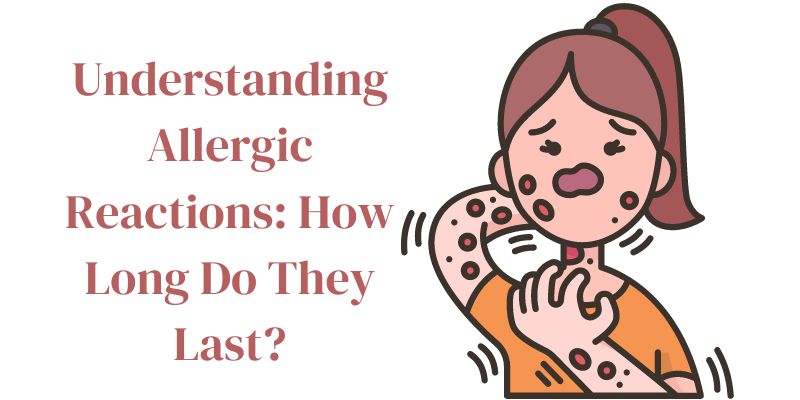Allergic reactions are the body’s way of defending itself against perceived threats, but sometimes, these reactions can be triggered by harmless substances. Whether it’s a bee sting, a specific food item, or a pollen allergy, understanding the duration of an allergic reaction is essential for managing and addressing potential risks. In this article, we will discuss the different types of allergic reactions and provide insights into how long they typically last. So, let’s discuss and gain a better understanding of allergic reactions and their durations.
How Long Do Allergic Reactions Last?
Immediate Allergic Reactions
Immediate allergic reactions, also known as Type I hypersensitivity reactions, are among the most common and potentially life-threatening allergic responses. They occur within seconds to minutes of exposure to an allergen and can affect various systems in the body. The duration of these reactions can vary but typically lasts anywhere from a few minutes to a few hours.
Delayed Allergic Reactions
Some allergic reactions, such as contact dermatitis or delayed-type hypersensitivity reactions, take longer to manifest. These reactions can develop over a period of hours to days after exposure to the allergen. The duration of delayed allergic reactions can range from a few days to several weeks, depending on the individual and the specific allergen involved.
Seasonal Allergies
Seasonal allergies, often triggered by pollen, mold spores, or other environmental allergens, typically occur during specific times of the year. The duration of seasonal allergies can vary depending on the allergen and the duration of the exposure. In some cases, symptoms may last for several weeks to months, corresponding to the specific allergy season.
Food Allergies
Food allergies can cause immediate or delayed allergic reactions, depending on the individual and the type of allergen. Immediate food allergy symptoms usually subside within a few hours, while delayed reactions may persist for several days. However, it’s important to note that severe food allergies, such as those leading to anaphylaxis, require immediate medical attention and can last longer if not treated promptly.
Insect Sting Allergies
Allergic reactions to insect stings, such as bee or wasp stings, can vary in duration. Mild reactions may last for a few hours, characterized by localized pain, redness, and swelling. However, severe allergic reactions (anaphylaxis) can be life-threatening and require immediate medical intervention if left untreated.
Conclusion
The duration of an allergic reaction depends on several factors, including the type of allergen, the individual’s sensitivity, and the severity of the reaction. While some allergic reactions may resolve within minutes or hours, others can persist for days or even weeks. It is crucial to recognize the signs and symptoms of allergic reactions and seek medical attention when necessary, especially in the case of severe reactions. If you suspect you have allergies, consult with an allergist who can provide personalized guidance and treatment options tailored to your specific needs. Remember, timely management is key to minimizing the impact of allergic reactions on your health and well-being.
By understanding the duration of allergic reactions and addressing them appropriately, individuals can lead healthier, safer lives and minimize the impact of allergies on their daily routines.
You may also like:
Can Allergies Cause Body Aches?
Can Allergies Cause Chest Pain?
How to Stop Sneezing? {10 Ways}
FAQs
Q:- How can I determine the cause of my allergic reaction’s duration?
Ans:- Identifying the specific cause of an allergic reaction’s duration often requires consulting with a healthcare professional, such as an allergist. Allergy testing, which can include skin tests or blood tests, can help pinpoint the allergen responsible for the reaction and guide appropriate management and prevention strategies.
Q:- Can allergic reactions change over time in terms of duration and severity?
Ans:- Yes, allergic reactions can evolve over time. Some individuals may experience changes in the duration and severity of their allergies. It is essential to stay vigilant and seek regular follow-ups with an allergist to adapt your treatment plan as needed.
Q:- Are there any home remedies to alleviate the duration of mild allergic reactions?
Ans:- For mild allergic reactions, such as itching or skin irritation, you can try over-the-counter antihistamines or topical corticosteroid creams to relieve symptoms. However, it’s crucial to consult with a healthcare provider before attempting home remedies, as some reactions may worsen without proper treatment. Severe allergic reactions require immediate medical attention and should not be managed at home.
